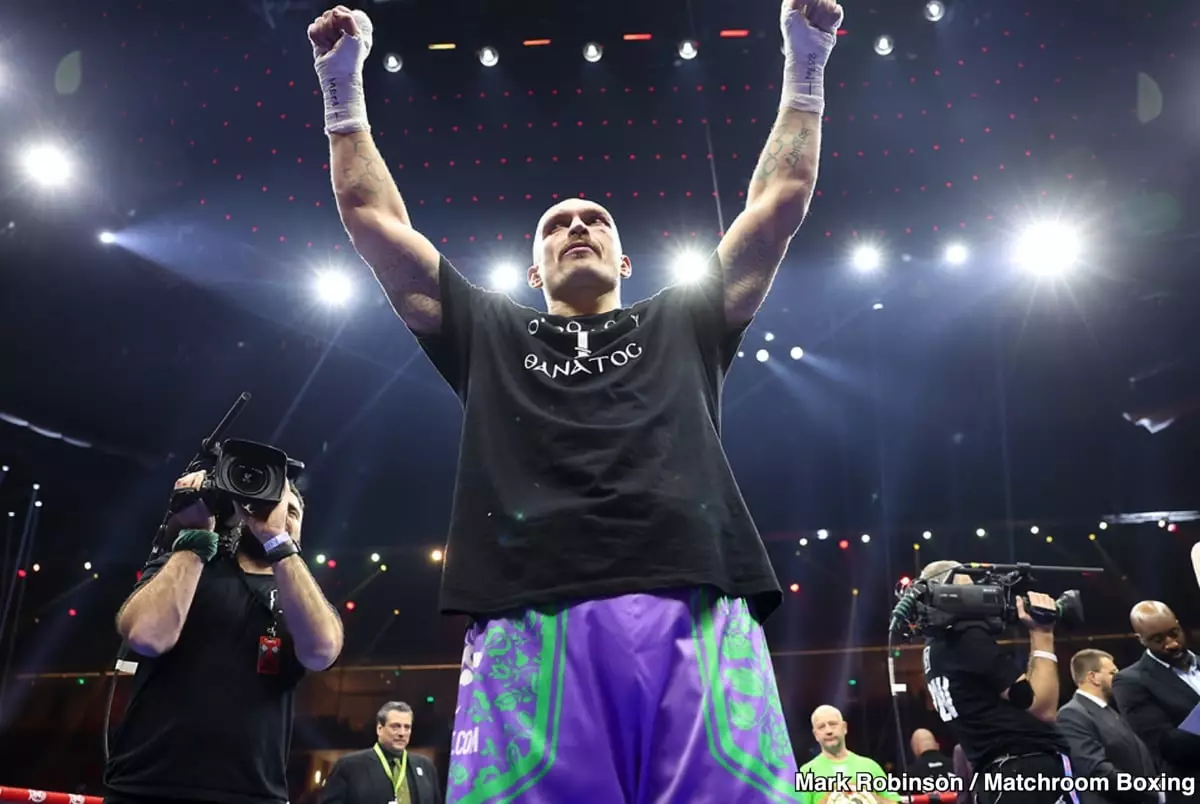Oleksandr Usyk has become a household name in the boxing world, celebrated for his remarkable achievements and technical prowess. The Ukrainian fighter bagged the title of unified heavyweight champion after a stellar career that began in the cruiserweight division, where he not only unified the titles but also claimed the prestigious World Boxing Super Series trophy. His explosive rise through the ranks and ability to defeat top talents like Anthony Joshua and Tyson Fury have incited discussions that transcend the ring, leading to the inevitable question: does Usyk warrant the title of an all-time great?
Regarding accolades, Usyk’s résumé is hard to dismiss. His record stands at an impressive 22 victories without a single defeat, showcasing his dominance in both weight classes. Achievements such as capturing multiple titles in the amateur arena, including Olympic gold and World Championship medals, add further weight to his legacy. Yet, amidst the glowing praise, former champion Tim Bradley provides a starkly contrasting viewpoint, arguing that Usyk’s transformation into an all-time great status is premature and questionable.
Bradley’s critical stance is thought-provoking, as he emphasizes that Usyk’s success within the heavyweight division is built on a limited number of fights. The assertion that only seven heavyweight matches are insufficient to solidify one’s place among boxing legends prompts a robust dialogue. Shouldn’t the quality of opponents faced and the caliber of victories be of greater importance than the quantity of bouts? After all, the impact of a fighter’s performance often overshadows the number of matches they have participated in over their career.
Bradley contends that Usyk’s triumphs over Joshua and Fury do not justify the label of an all-time great. His argument suggests that a few notable victories do not equate to greatness. While it is true that Usyk has yet to face all contenders in the heavyweight division, including potential rematches with Daniel Dubois and Joseph Parker, is it fair to diminish his accomplishments solely based on a subjective measure of “cleaning out” the division? This raises further concerns about the criteria established for greatness, which may vary substantially across boxing enthusiasts and experts alike.
To critically assess Bradley’s viewpoint, one must consider the nature of boxing itself. The sport is not solely about numbers; it’s about legacy, skill, and the ability to rise to challenges. Usyk’s ability to defeat larger opponents like Joshua and Fury has led many to view him as a generational talent. Notably, the history of boxing has seen many fighters recognized as greats after just a few defining victories, suggesting that excellence shines through even within tightly contested realms.
Moreover, Usyk’s exceptional performance under duress amplifies the debate surrounding his status. Not only has he faced adversity inside the ring, but the tumultuous context of his homeland burdened with conflict presents a narrative of resilience. Competing against the backdrop of his nation’s struggles, Usyk attributes emotional and psychological strength that arguably enhances his legacy. This contextual layer prompts one to consider whether greatness is measured purely by statistical records or if it also includes the stories and experiences that enrich a fighter’s journey.
The Path Forward: What More Can Usyk Achieve?
As Usyk contemplates his career trajectory—whether to continue within heavyweight ranks or return to cruiserweight—the scrutiny of his legacy will undoubtedly continue. Critics like Bradley serve an essential function in the ecosystem of boxing, prompting rigorous analysis and debate. The overarching question persistently remains: what more must a fighter accomplish to earn the coveted title of an all-time great?
The boxing community must grapple with these considerations as Usyk’s career progresses. Winning rematches, facing other top-tier contenders, or rediscovering his roots in cruiserweight could all contribute to reshaping opinions about his status. However, the reality stands that even after all he has achieved, opinions on his greatness will remain diverse, underscoring the subjective essence of the sport itself.
The case of Oleksandr Usyk is emblematic of the complexities surrounding the notion of greatness in boxing. While critics may remain skeptical, his accomplishments speak volumes and pave the way for an evolving narrative that transcends mere records. Ultimately, whether labeled an all-time great or not, Usyk’s impact on boxing is undeniable, securing his place in the annals of the sport’s rich history.

